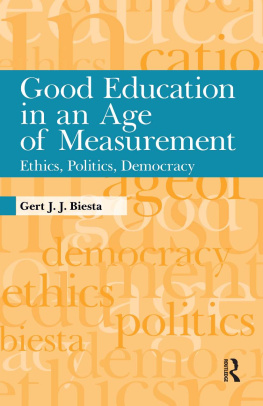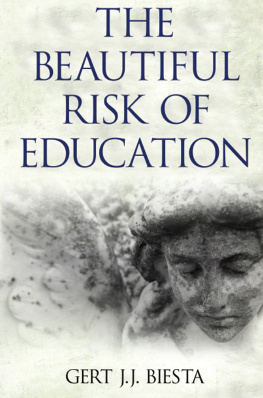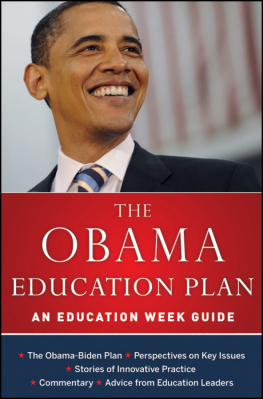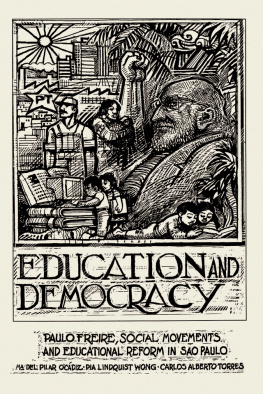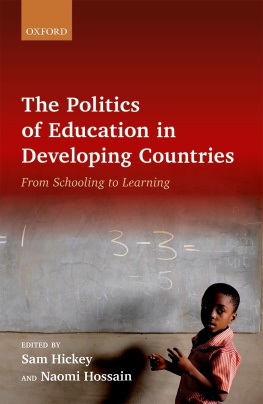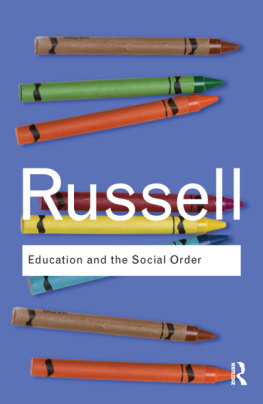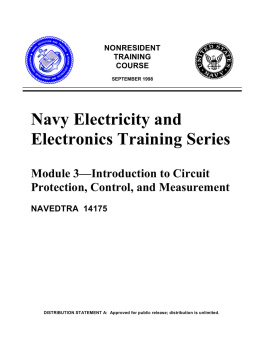Good Education in an Age of Measurement
Interventions: Education, Philosophy & Culture
Michael A. Peters & Colin Lankshear, Series Editors
Education, Globalization, and the State in the Age of Terrorism
edited by Michael A. Peters (2005)
Beyond Learning: Democratic Education for a Human Future
by Gert J. J. Biesta (2006)
Democracy, Ethics, and Education: A Thin Communitarian Approach
by Mark Olssen (2009)
Toward an Imperfect Education: Facing Humanity, Rethinking Cosmopolitanism
by Sharon Todd (2009)
Good Education in an Age of Measurement: Ethics, Politics, Democracy
by Gert J. J. Biesta (2010)
Good Education in an Age of Measurement
Ethics, Politics, Democracy
Gert J. J. Biesta
First published 2010 by Paradigm Publishers
Published 2016 by Routledge
2 Park Square, Milton Park, Abingdon, Oxon OX14 4RN
711 Third Avenue, New York, NY 10017, USA
Routledge is an imprint of the Taylor & Francis Group, an informa business
Copyright 2010, Taylor & Francis.
All rights reserved. No part of this book may be reprinted or reproduced or utilised in any form or by any electronic, mechanical, or other means, now known or hereafter invented, including photocopying and recording, or in any information storage or retrieval system, without permission in writing from the publishers.
Notice:
Product or corporate names may be trademarks or registered trademarks, and are used only for identification and explanation without intent to infringe.
Library of Congress Cataloging-in-Publication Data
Biesta, Gert J. J.
Good education in an age of measurement: ethics, politics, democracy / Gert J.J. Biesta.
p. cm. (Interventions, education, philosophy & culture)
Includes bibliographical references and index.
ISBN 978-1-59451-790-7 (hardcover: alk. paper)
ISBN: 978-1-59451-791-4 (paperback: alk. paper)
1. Educational tests and measurementsPolitical aspects. 2. Effective teaching. 3. School improvement programs. I. Title.
LB3051.B483 2010
370.1dc22
2009036146
Designed and Typeset by Straight Creek Bookmakers.
ISBN 13: 978-1-59451-790-7 (hbk)
ISBN 13: 978-1-59451-791-4 (pbk)
Contents
Evidence-Based Education between
Science and Democracy |
Education between Accountability
and Responsibility |
Education, Democracy and the Question
of Inclusion |
From the point of view of the reader, books often present themselves as finished and complete products. From the perspective of the writer, however, they are always located within a particular context and are connected to specific events and experiences. This book is no exception. The main motivation for writing this book stems from my encounters with teachers working in a wide variety of educational settings and systems across the world. I have found many of them to be at least as passionate about education as I am, and I have seen them devoting a significant part of their lives to the difficult task of education. They often do so under complex circumstances, particularly when policy imperatives severely restrict their opportunities to follow their educational intuition and act upon their own professional judgment. Although many teachers are concerned about the quality of educationnot in the abstract sense of quality indicators and league tables but in the much more concrete sense of what education can do for the children, young people and adults they teachin my experience teachers, but also administrators, those working in educational support and development roles, and educational policymakers, sometimes find it difficult to articulate and justify their views and beliefs about what education is for, what good education is, and what is educationally desirable. I do not believe that those involved in education are unable to make such judgments. I have rather come to the conclusion that many of those working in education lack a vocabulary to raise questions about the aims and ends of education and, in relation to this, often also lack real opportunities for asking such questions. The ideas presented in this book are not only an attempt to understand why it has become more difficult to ask the question, "What is good education?" I also offer suggestions for ways of speaking that might be helpful in giving the question of what education is for a more prominent place in our educational practices. For me this has everything to do with the development of a language that is genuinely educational, as I believe that the language of learning that has become so dominant in recent times has actually made it more difficult to ask questions about what good education might look like.
Although I do riot wish to pretend that the ideas presented in this book will settle the discussion about good education once and for all, I have been encouraged by the ways in which those involved in teaching at many different levels and in many different contexts have responded to my work and have found some of the insights and ideas useful. I particularly would like to mention my colleagues and students at the Institute of Education of the University of Stirling, my new academic home; the inspiring people from the Seven Oaks School Division in Winnipeg, Canada; and staff and students at the University of rebro and at Mlardalen University, Sweden, and at the University of Oulu, Finland. I would like to thank all of them for the many fruitful discussions about matters of educational concern. I also would like to mention my former and current doctoral students who continue to inspire me with their dedication, energy, and creativity. Finally I would like to thank Dean Birkenkamp for his confidence in this project and for his continuous support.
Prologue
On the Question of Purpose in Education
If the number of hits on Internet search engines is anything to go by, there is no shortage of views about good education. A Google search for "good education" results in 1,360,000 hits, while Yahoo even goes to 5,830,000. Even if we take away fake hits such as "shop here for 'good education," the numbers still indicate that the question of good education is a concern of many. To a certain extent this is not surprising, not in the least because it is quite difficult to be against good education (although "bad education" still generates about 400,000 hits on Google and 800,000 on Yahoo). But the real question is not whether we should be for or against good education. The real question is what actually constitutes good education and, more important, how we might be able to discuss and develop our ideas about good education in a way that goes beyond just articulating our personal preferences. The aim of this book is to make a contribution to such a discussion.
One reason for writing this book stems from the observation that the question of what constitutes good education almost seems to have disappeared from discussions about education. Although the question of good education is a difficult and contentious question, I believe that it is also the most central and most important question we can and should ask about our educational endeavors. Education, be it in the form of schooling, workplace learning, vocational training or learning through life, is by its very nature a process with direction and purpose. That is why the question of good educationthe question as to what education is for is not optional but always poses itself when we engage in educational activities, practices and processes.

